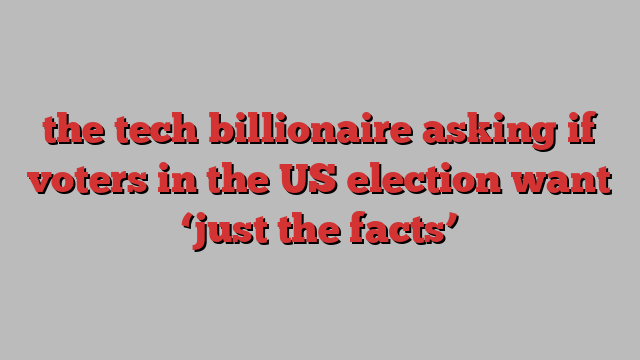
Unlock the US Election Countdown newsletter for free
The stories that matter on money and politics in the race for the White House
Elon Musk has used his ownership of X to promote Donald Trump’s re-election as “the only way to save democracy”. Jeff Bezos’s commitment to The Washington Post’s “Democracy Dies in Darkness” motto is in question after he stopped his paper from endorsing a presidential candidate. And the role Mark Zuckerberg’s social media platforms play in spreading political misinformation remains a topic for furious argument.
Five spots below them on Bloomberg’s list of the world’s richest people, a lower-profile tech billionaire finds himself similarly preoccupied by politics.
Steve Ballmer, who succeeded Bill Gates and preceded Satya Nadella at Microsoft’s helm, has made it his mission to build a better democracy with data. Ahead of next Tuesday’s US election, he has been trying to turn USAFacts, a not-for-profit civic initiative, into a source of dispassionate statistics to inform the country’s enraged debates.
“I think of . . . the twin towers of America as democracy and capitalism — and they both have to work well,” the self-styled centrist said in an interview with the Financial Times. “This is a small contribution we might be able to make on the democracy side.”
USAFacts has its roots in Ballmer’s efforts to understand where his own tax dollars were going. He launched it in 2017 as an effort to “understand government by the numbers”. This year, he has ramped up its efforts with a series of videos promising to give voters “no rhetoric, no bias, just the facts” on inflation, immigration and other issues that Donald Trump and Kamala Harris are fighting over.
Search for “Steve Ballmer video” and the first result YouTube returns may be “Steve Ballmer going crazy on stage”, a montage of moments of corporate exuberance in which he leapt and yelped across stages, whipping up the Microsoft faithful. His USAFacts videos are by contrast studiously understated, featuring the bald 68-year-old in a pale blue shirt, soberly talking over animated charts for 15 minutes at a time.
Viewers can learn that consumer prices have risen 19 per cent in the US since the pandemic, that 0.7 per cent of the people apprehended at US borders have a prior criminal conviction, or that nearly 94 per cent of reported abortions happen within the first two-and-a-half months of pregnancy.
Why so many figures? “A number is a number, it’s indisputable. It’s either one or it’s not,” the former Harvard mathematician explained.
Even as he defended numbers, though, Ballmer acknowledged that many people didn’t like them. “They like adjectives, and adjectives are partisan.”
“The world has gotten more sound-bitey,” he lamented. So while long-form journalism persisted, Ballmer estimated that the audience for it was just “millions to tens of millions” of people in a country of just over 337mn, by the US Census Bureau’s latest count.
Asked where the fault lies, he points to his old industry: “The rise of the mobile device is probably the biggest thing, because it almost encourages snacking.” The owner of the Los Angeles Clippers has sat in National Basketball Association meetings seeing how few minutes of a game fans watch if they are on their phones rather than in front of a TV.
Ballmer sees social media platforms such as those Musk and Zuckerberg control playing a secondary role in our distraction. “I won’t say it’s Facebook or Twitter [now X] or Instagram or TikTok particularly, but they have built upon the usage patterns that make sense for the mobile device,” he said.
The rise of artificial intelligence, a technology some see as a game-changing risk to our confidence in reality, seems to worry him less. “We had misinformation before AI,” he noted.
Ballmer had been spending $10mn to $20mn a year on USAFacts, but has raised that to $40mn this year. Still, given his estimated $148bn fortune, it doesn’t seem much. “No, not in the grand scheme of what I’ve been blessed with,” he conceded.
Is it enough to redress society’s anti-fact drift? “Can we spend more? Sure, we could always spend more but I don’t want to spend more in a way that just gets people to snack more,” while adding to his interviewer: “You guys need to do your jobs.”
Ballmer has taken his just-the-facts pitch to Capitol Hill, trying to convince Congress to ground its legislation in facts and to sign a document saying it believes in government data. “I don’t feel like I got much traction,” he admitted.
How, then, does he measure the impact of his earnest attempt to encourage citizens to study the facts — all of them — and then make up their own minds?
“Impact is hard. Usage, not hard. Impact hard,” he replied. He can measure that USAFacts has 360,000 newsletter subscribers and his latest video series has racked up more than 45.5mn views. But “will it change the way anybody votes on anything? Don’t know.”